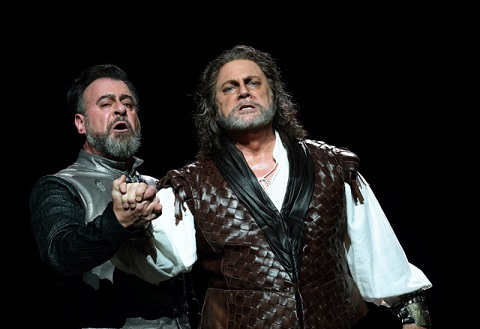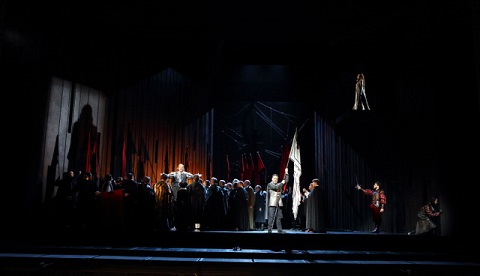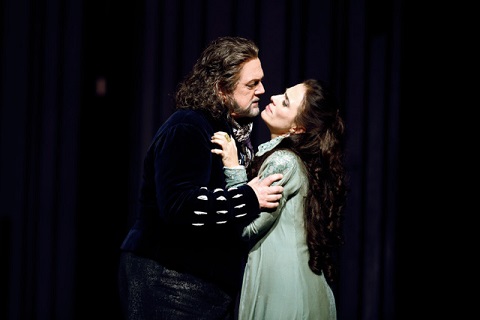
12 Dec 2019
Otello at Covent Garden: superb singing defies Warner’s uneven production
I have seen productions of Verdi’s Otello which have been revolutionary, even subversive. I have now seen one which is the complete antithesis of that.
English Touring Opera are delighted to announce a season of lyric monodramas to tour nationally from October to December. The season features music for solo singer and piano by Argento, Britten, Tippett and Shostakovich with a bold and inventive approach to making opera during social distancing.
This tenth of ten Live from London concerts was in fact a recorded live performance from California. It was no less enjoyable for that, and it was also uplifting to learn that this wasn’t in fact the ‘last’ LfL event that we will be able to enjoy, courtesy of VOCES8 and their fellow vocal ensembles (more below …).
Ever since Wigmore Hall announced their superb series of autumn concerts, all streamed live and available free of charge, I’d been looking forward to this song recital by Ian Bostridge and Imogen Cooper.
Although Stile Antico’s programme article for their Live from London recital introduced their selection from the many treasures of the English Renaissance in the context of the theological debates and upheavals of the Tudor and Elizabethan years, their performance was more evocative of private chamber music than of public liturgy.
Evidently, face masks don’t stifle appreciative “Bravo!”s. And, reducing audience numbers doesn’t lower the volume of such acclamations. For, the audience at Wigmore Hall gave soprano Elizabeth Llewellyn and pianist Simon Lepper a greatly deserved warm reception and hearty response following this lunchtime recital of late-Romantic song.
For this week’s Live from London vocal recital we moved from the home of VOCES8, St Anne and St Agnes in the City of London, to Kings Place, where The Sixteen - who have been associate artists at the venue for some time - presented a programme of music and words bound together by the theme of ‘reflection’.
'Such is your divine Disposation that both you excellently understand, and royally entertaine the Exercise of Musicke.’
‘And there was war in heaven: Michael and his angels fought against the dragon; and the dragon fought and his angels, And prevailed not; neither was their place found any more in heaven … that old serpent … Satan, which deceiveth the whole world: he was cast out into the earth, and his angels were cast out with him.’
There was never any doubt that the fifth of the twelve Met Stars Live in Concert broadcasts was going to be a palpably intense and vivid event, as well as a musically stunning and theatrically enervating experience.
‘Love’ was the theme for this Live from London performance by Apollo5. Given the complexity and diversity of that human emotion, and Apollo5’s reputation for versatility and diverse repertoire, ranging from Renaissance choral music to jazz, from contemporary classical works to popular song, it was no surprise that their programme spanned 500 years and several musical styles.
The Academy of St Martin in the Fields have titled their autumn series of eight concerts - which are taking place at 5pm and 7.30pm on two Saturdays each month at their home venue in Trafalgar Square, and being filmed for streaming the following Thursday - ‘re:connect’.
The London Symphony Orchestra opened their Autumn 2020 season with a homage to Oliver Knussen, who died at the age of 66 in July 2018. The programme traced a national musical lineage through the twentieth century, from Britten to Knussen, on to Mark-Anthony Turnage, and entwining the LSO and Rattle too.
With the Live from London digital vocal festival entering the second half of the series, the festival’s host, VOCES8, returned to their home at St Annes and St Agnes in the City of London to present a sequence of ‘Choral Dances’ - vocal music inspired by dance, embracing diverse genres from the Renaissance madrigal to swing jazz.
Just a few unison string wriggles from the opening of Mozart’s overture to Le nozze di Figaro are enough to make any opera-lover perch on the edge of their seat, in excited anticipation of the drama in music to come, so there could be no other curtain-raiser for this Gala Concert at the Royal Opera House, the latest instalment from ‘their House’ to ‘our houses’.
"Before the ending of the day, creator of all things, we pray that, with your accustomed mercy, you may watch over us."
The doors at The Metropolitan Opera will not open to live audiences until 2021 at the earliest, and the likelihood of normal operatic life resuming in cities around the world looks but a distant dream at present. But, while we may not be invited from our homes into the opera house for some time yet, with its free daily screenings of past productions and its pay-per-view Met Stars Live in Concert series, the Met continues to bring opera into our homes.
Music-making at this year’s Grange Festival Opera may have fallen silent in June and July, but the country house and extensive grounds of The Grange provided an ideal setting for a weekend of twelve specially conceived ‘promenade’ performances encompassing music and dance.
There’s a “slide of harmony” and “all the bones leave your body at that moment and you collapse to the floor, it’s so extraordinary.”
“Music for a while, shall all your cares beguile.”
The hum of bees rising from myriad scented blooms; gentle strains of birdsong; the cheerful chatter of picnickers beside a still lake; decorous thwacks of leather on willow; song and music floating through the warm evening air.

I have seen productions of Verdi’s Otello which have been revolutionary, even subversive. I have now seen one which is the complete antithesis of that.
Keith Warner’s production - with the help, or hindrance, of Boris
Kudlička’s sets - is a dark tunnel through which we travel, down an endless
vortex, into this Shakespearian carnage of intrigue, jealousy and murder.
If it has a single virtue it is that it rarely interferes with the
Otello-Iago-Desdemona triangle because what Warner does is allow these
characters to take to the stage as if completely exposed before us. The
sheer minimalism of this, at times, expressionist design is fraught with
danger, however; it relies entirely on three singers who can sing and act
their way through the emotional complexity of Boito’s libretto. Thankfully,
that is largely what the casting of this first revival of Warner’s 2017
production achieves.
Gregory Kunde’s Otello, grizzlier than usual, but struggling to exert his
victorious supremacy in the opening scene, is simply overwhelmed by
Warner’s grand setting during the storm. But this isn’t atypical of this
production; the big choruses, the fights are projected to be epic. The
elements of earth, air and water are all there it’s just that Kunde’s
‘Esultate!’ is rather shipwrecked by the excessiveness of the staging
around him. However, when Warner allows his Otello to take centre stage,
Kunde is magnificent in fleshing out a character who is on the brink of
destruction for his obsessive love of Ermonela Jaho’s fragile Desdemona and
the decaying jealousy which will inevitably conclude in their deaths.
Carlos Álvarez’s monstrously manipulative Iago is both literally, and
metaphorically, tinted through the duality of two opposing veils. The black
and white masks which Iago juggles with - notably in the ‘Credo’ - are in
essence but shadows of Kudlička’s sets: those vast black-walled
shape-shifting screens which suddenly give way in Act IV to the purity and
blanched whiteness of Desdemona’s bedroom are striking, if perhaps
inevitably obvious.
 Photo credit: Catherine Ashmore.
Photo credit: Catherine Ashmore.
There is, I think, more to Warner’s Iago than meets the eye; or, perhaps it
was entirely how Álvarez decided this Iago should be played. Boito doesn’t
particularly stretch the motives for Iago’s deception of Otello; but Warner
does, at least, make him more Mephistophelean than we usually get, at least
implying there is something more deeply rooted in this character’s
malevolence. Warner places his Iago in a smoke-churning, almost Hades-like
furnace, during the ‘Credo’ so the suggestion is at least there that there
is more than just envy motivating him. If the Bonfire Chorus had been a
seething, almost Macbeth-like display of vivid colour the ‘Credo’ is
plunged into semi-darkness with just the grey remains of the smoking fire
pumping up from the stage. But this still isn’t an Iago who slivers like a
snake, a Cobra ready to inject his final poison. Rather, what you see is
what you get; the scales on his coat jacket reminding us that his mendacity
isn’t even skin deep.
Of course, emotion in Otello is inversely framed. Álvarez proved
more than capable of making Iago deliberately devoid of it; his was a
particularly powerful portrait of an Elizabethan ‘Revenge’ character.
Kunde, on the other hand, walked a neat tightrope between his jealousy and
his obsession. Jaho’s Desdemona - perhaps as one might expect for a singer
so adept at singing Puccini heroines - was touching and vulnerable. What
was undeniable was the superb chemistry between the three singers which
made the tragic end all the more devastating.
 Gregory Kunde as Otello and Ermonela Jaho as Desdemona Photo credit: Catherine Ashmore.
Gregory Kunde as Otello and Ermonela Jaho as Desdemona Photo credit: Catherine Ashmore.
That chemistry was also apparent in the blending of the voices and the
refined, studied acting. There is something of the Madonna about the role
of Desdemona (though you generally struggle to see that in Warner’s
production - in the Homage Chorus it seemed notably absent). Jaho is so
slight she is like a porcelain figurine, delicate and fragrant, with a
voice to match. If it isn’t particularly firm, it is exquisitely refined -
and impressively able to float pianissimos like butterflies in
flight. We got a ‘Willow Song’ from her which was unexpectedly touching,
often completely reflective of Verdi’s orchestration (mirroring a clarinet
here or there) - but it also had the right amount of pent-up emotion.
That Kunde’s Otello should have been such a formidable presence, and that
the voice was generally so powerful, made his relationship between
Desdemona and Iago more balanced than it usually is. The fact Kunde is a
tenor who can howl and rage when he needs to, carved out a brutalist
portrayal of an Otello who clearly made his presence felt. This was rather
striking in Act IV, in the bed chamber, where Kunde simply had to be on
stage against an orchestra where double basses were muted to exert a power
which was just simply menacing. He could be lyrical with Desdemona (in
their Love Duet) and then simmer with uncontrollable ravings when his
jealousy manifested itself. It was an entirely complete portrayal of a
complex character.
Carlos Álvaros’s Iago - as is so often the case in performances of Otello - was layered with riches. This was an Iago, that even when
Otello turned on him during ‘Tu! Indietro! Fuggi’ resolutely refused to be
cowed, an Iago, who in the closing Act II duet with Otello, where the act
of vengeance is sworn, ripped through the orchestra. As a study in base
psychological terror, emotional coldness and premeditated evil it was a
formidable achievement. His voice is dark, yet steady, and at times sounds
almost deliberately anti-lyrical but that is perfectly suitable for Iago.
In the magnificent Quartet, where Iago tricks Emilia into giving him the
handkerchief it, was Álvarez who was the focus of attention - despite being
all but occluded behind the latticed backdrop. The irony, of course, is
that Iago has almost nothing to sing - while Desdemona carries almost the
whole of the piece.
There were almost no weak links in the rest of the cast. Freddie de
Tommaso’s Cassio was cleverly cast - a handsome figure drawn into Iago’s
scheming but entirely plausible as guilty to a jealous Otello, and innocent
enough for Iago to revel in his power to ruin others’ lives. He sang
beautifully, capturing the brawling, hard-drinking, quick-to-arms roguish
captain. Andrés Presno was a decent Roderigo, Catherine Carby an Emilia
tricked into the unfolding plot devised by Iago, then touching in her final
scene with Desdemona.
This is in many ways what I would describe as an anti-production. There are
merits to this, assuming one has a cast of principals who have the
chemistry to work together and a conductor who readily views Otello as the magnificent achievement it is. Antonio Pappano is
clearly of this view - and that was apparent from the opening storm, paced
with a visceral energy that never really receded throughout the rest of the
opera. Pappano’s gift, especially where the score demands tonal colour
(such as in the prelude and first scene of Act IV, or the Bonfire Chorus)
is to give the music a true Verdian palate. Some of the instrumental
details, the woodwind phrasing, the beautifully balanced off-stage brass
and their genuinely golden hue, were very impressively done.
But Warner’s reliance on his cast is a risk, especially when some of this
production seems tenuous. One wondered, for example, what the shattered
remnants of the Lion of Venice symbolised in the rafters of a room in Act
IV. Nice little touches, such as Otello’s blood spurting like a red inkjet
against the white wall in front of Desdemona’s bed, were few and far
between.
We should certainly be grateful that this Otello was the artistic
achievement it was; future revivals of it might not be quite so lucky.
Marc Bridle
Otello - Gregory Kunde, Desdemona - Ermonela Jaho , Iago - Carlos Álvarez,
Cassio - Freddie de Tommaso, Roderigo - Andrés Presno, Emilia - Catherine
Carby, Montano - Michael Mofidia, Lodovico - David Soar, Herald - Dawid
Kimberg; Director - Keith Warner, Conductor - Antonio Pappano, Set Designer
- Boris Kudlička, Lighting Designer - Bruno Poet, Costume Designer - Kaspar
Glarner, Movement Director - Michael Barry, Fight Director - Ran Arthur
Braun, Trinity Boys’ Choir, Tiffin Children’s Chorus, Chorus and Orchestra
of The Royal Opera House.
Royal Opera House, Covent Garden, London; Monday 9th December 2019.